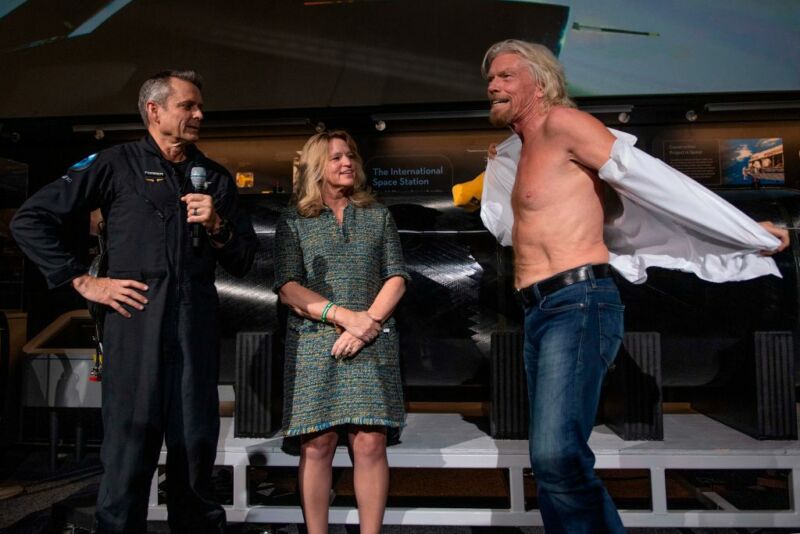
Amazon founder Jeff Bezos said on Monday he would fly on the first human spaceflight of his company’s New Shepard spacecraft. This mission will launch from Blue Origin’s spaceport in West Texas on July 20, which is the anniversary of the Apollo 11 lunar landing in 1969.
With this timeline, Bezos seemed almost certain to beat his suborbital space tourism rival, Sir Richard Branson, into space. Setting aside whether Branson’s VSS Unity vehicle reaches space—its maximum altitude is just below the Kármán line, or 100 km—this is nonetheless a meaningful milestone.
Both Bezos and Branson have been investing in the space industry for about two decades, and both men have made clear they intend to fly on their own spacecraft as soon as practically possible.
For Branson, that flight was expected to come during the second half of this year. As recently as one week ago, Sirisha Bandla—vice president of government affairs for Branson’s Virgin Galactic—told Ars that the company’s plan next called for a test flight with four employees in the passenger cabin. That test, she added, would be followed by a flight carrying Branson.
“We’ve got three test flights left,” Bandla said. “We’ve got a flight with employees in the cabin. A flight with our founder, Sir Richard Branson, after that, and then to round out our flight test program, we are flying the Italian Air Force.”
However, the Bezos spaceflight scheduled for July 20 may have scrambled those plans. According to a report by Doug Messier on his Parabolic Arc website, “Virgin Galactic is working on a plan to send Branson on a suborbital flight aboard the VSS Unity SpaceShipTwo rocket plane over the July 4 holiday weekend.”
This would beat Bezos by a couple of weeks.
The report seems plausible. A space reporter based in Mojave, California, Messier has long been critical of Virgin Galactic’s operations, and he certainly has a jaded view of the company’s business prospects. However, as Messier is based where Virgin Galactic was founded and operated for more than a decade, he is not without credible sources. And given Branson’s penchant for showmanship and willingness to take personal risk, this report could very well be true.
Ars and other media outlets asked Virgin Galactic for a response to Messier’s report on Tuesday, and the company returned a non-answer answer. “We are in the process of analyzing the data from our successful May 22nd flight,” the company’s statement said. “As previously announced, we expect to complete the final test flights this summer through to early fall. At this time, we have not determined the date of our next flight.”
Everything in the statement is true. However, given the opportunity to shoot down Messier’s report—and the company probably would like nothing more than to knock down a reporter who has been critical of Branson and his space efforts—Virgin Galactic’s communications team chose not to do so.
In recent years, and especially following a fatal accident with a prototype of its space plane in 2014, Virgin Galactic has said it would not fly until its vehicles are ready. Moreover, the plan had been to fly Virgin employees on the next mission.
“One has to hope that, whatever previous plans and schedule Virgin Galactic had, things aren’t going to be rushed to secure bragging rights on who goes first,” Alan Ladwig, author of See You In Orbit?, a book on human space tourism, told Ars. “The speculation about flying before Bezos seems rushed. Let’s hope safety remains the top priority and triggers aren’t pulled too soon.”
So is Virgin Galactic rushing things here? It is plausible that, if the May 22 flight went well (and it seems to have), the VSS Unity spacecraft and its carrier aircraft could be ready again by early July. Only a little more than two months passed between the first (December 13, 2018) and second (February 22, 2019) spaceflights of VSS Unity. This time, the turnaround would be about 1.5 months. As Messier notes, to fly Branson, Virgin Galactic must also obtain a commercial reusable spacecraft operator’s license from the Federal Aviation Administration.
So, to get Branson into space, perhaps it is just a little juggling of the manifest, some paperwork, and moderately accelerating work on the vehicles. Perhaps.
https://arstechnica.com/?p=1771471

